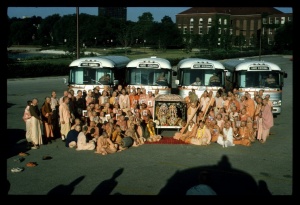SB 10.13.26: Difference between revisions
m (1 revision(s)) |
(Vanibot #0018 edit: make synonym terms in Sanskrit italic in SB - Vanisource) |
||
| Line 1: | Line 1: | ||
{{info | {{info | ||
|speaker= | |speaker=Śukadeva Gosvāmī | ||
|listener=King | |listener=King Parīkṣit | ||
}} | }} | ||
[[Category:Srimad-Bhagavatam - Canto 10 Chapter 13]] | |||
[[Category:Bhagavatam Verses Spoken by Sukadeva Gosvami - Vanisource|101326]] | |||
<div style="float:left">'''[[Srimad-Bhagavatam]] - [[SB 10|Tenth Canto]] - [[SB 10.13: The Stealing of the Boys and Calves by Brahma|Chapter 13: The Stealing of the Boys and Calves by Brahmā]]'''</div> | |||
<div style="float:right">[[File:Go-previous.png|link=SB 10.13.25]] '''[[SB 10.13.25]] - [[SB 10.13.27]]''' [[File:Go-next.png|link=SB 10.13.27]]</div> | |||
{{RandomImage}} | |||
==== TEXT 26 ==== | ==== TEXT 26 ==== | ||
<div | <div class="verse"> | ||
vrajaukasāṁ sva-tokeṣu | :vrajaukasāṁ sva-tokeṣu | ||
sneha-vally ābdam anvaham | :sneha-vally ābdam anvaham | ||
śanair niḥsīma vavṛdhe | :śanair niḥsīma vavṛdhe | ||
yathā kṛṣṇe tv apūrvavat | :yathā kṛṣṇe tv apūrvavat | ||
</div> | </div> | ||
| Line 17: | Line 22: | ||
==== SYNONYMS ==== | ==== SYNONYMS ==== | ||
<div | <div class="synonyms"> | ||
vraja- | ''vraja-okasām''—of all the inhabitants of Vraja, Vṛndāvana; ''sva-tokeṣu''—for their own sons; ''sneha-vallī''—the creeper of affection; ''ā-abdam''—for one year; ''anu-aham''—every day; ''śanaiḥ''—gradually; ''niḥsīma''—without limit; ''vavṛdhe''—increased; ''yathā kṛṣṇe''—exactly accepting Kṛṣṇa as their son; ''tu''—indeed; ''apūrva-vat''—as it had not been previously. | ||
</div> | </div> | ||
| Line 24: | Line 29: | ||
==== TRANSLATION ==== | ==== TRANSLATION ==== | ||
<div | <div class="translation"> | ||
Although the inhabitants of Vrajabhūmi, the cowherd men and cowherd women, previously had more affection for Kṛṣṇa than for their own children, now, for one year, their affection for their own sons continuously increased, for Kṛṣṇa had now become their sons. There was no limit to the increment of their affection for their sons, who were now Kṛṣṇa. Every day they found new inspiration for loving their children as much as they loved Kṛṣṇa. | Although the inhabitants of Vrajabhūmi, the cowherd men and cowherd women, previously had more affection for Kṛṣṇa than for their own children, now, for one year, their affection for their own sons continuously increased, for Kṛṣṇa had now become their sons. There was no limit to the increment of their affection for their sons, who were now Kṛṣṇa. Every day they found new inspiration for loving their children as much as they loved Kṛṣṇa. | ||
</div> | </div> | ||
__NOTOC__ | |||
<div style="float:right; clear:both;">[[File:Go-previous.png|link=SB 10.13.25]] '''[[SB 10.13.25]] - [[SB 10.13.27]]''' [[File:Go-next.png|link=SB 10.13.27]]</div> | |||
__NOTOC__ | |||
__NOEDITSECTION__ | |||
Revision as of 12:17, 1 December 2017

A.C. Bhaktivedanta Swami Prabhupada
TEXT 26
- vrajaukasāṁ sva-tokeṣu
- sneha-vally ābdam anvaham
- śanair niḥsīma vavṛdhe
- yathā kṛṣṇe tv apūrvavat
SYNONYMS
vraja-okasām—of all the inhabitants of Vraja, Vṛndāvana; sva-tokeṣu—for their own sons; sneha-vallī—the creeper of affection; ā-abdam—for one year; anu-aham—every day; śanaiḥ—gradually; niḥsīma—without limit; vavṛdhe—increased; yathā kṛṣṇe—exactly accepting Kṛṣṇa as their son; tu—indeed; apūrva-vat—as it had not been previously.
TRANSLATION
Although the inhabitants of Vrajabhūmi, the cowherd men and cowherd women, previously had more affection for Kṛṣṇa than for their own children, now, for one year, their affection for their own sons continuously increased, for Kṛṣṇa had now become their sons. There was no limit to the increment of their affection for their sons, who were now Kṛṣṇa. Every day they found new inspiration for loving their children as much as they loved Kṛṣṇa.